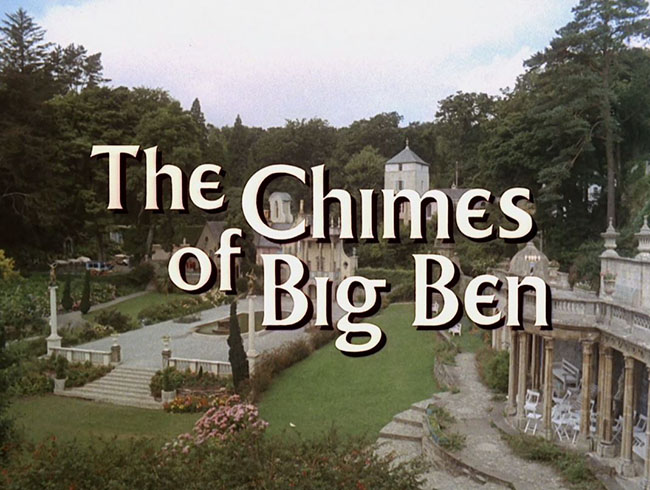THE CHIMES OF BIG BEN First UK Broadcast: October 6, 1967 [episode #2 in transmission order] | Written by Vincent Tilsey | Directed by Don Chaffey
SYNOPSIS
Nadia (Nadia Gray, La Dolce Vita) is the latest prisoner, transported on a stretcher from the Village helicopter. The new No.2 (Leo McKern, Rumpole of the Bailey) encourages No.6 to welcome her to her new home, as well as to make some effort to finally settle in on his own. No.6 suspects her at first, but after he witnesses the woman, an Olympic bronze medalist swimmer, incapacitated by Rover while attempting to swim free, she earns his empathy. In the Hospital, Nadia is submitted to cruel conditioning involving an electrically-charged floor. No.6 strikes a bargain with No.2: he will contribute to the Arts & Crafts Exposition as long as Nadia is entrusted to him and relieved of her torture. In the forest, he works on a wooden art piece carved with crude tools he makes himself. Nadia grows closer to 6 and begins to trust him. She explains that she’s Estonian, and she was assigned to study the Village before she was captured. According to Nadia, they are in Lithuania off the Baltic Sea. No.6 promises to get them out of the Village and into London, where she can finally hear her beloved “Chimes of Big Bill.” (“Big Ben,” No.6 corrects her.) No.6 wins first prize in the Arts & Crafts Expo and uses his winnings to purchase one of the other artists’ entries: a canvas of No. 2 which 6 promises to hang in his home. Instead, he uses it as a sail, converting his abstract art piece into a boat, and he and Nadia shove off under cover of darkness. They escape Rover, and with the help of one of Nadia’s Polish contacts – who gives No.6 a watch to synchronize their timetables – they ship themselves in a crate through Copenhagen to London. When the crate is opened, they are in the office of Fotheringay (Richard Wattis) and “Colonel J” (Kevin Stoney), No.6’s former associates in the agency for which he worked. After Nadia is led away, the Colonel expresses great skepticism about Nadia and the existence of the Village. He questions him as to why he resigned. No.6 is about to give his reasons when he realizes that Big Ben has chimed the time showing on his watch – 8:00 – despite the fact that there should be a one-hour difference since his watch is on Polish time. No.6 discovers that the sounds of street traffic are not coming from outside, but a speaker in the cupboard. He walks out the front door, where the Village is waiting for him. In the Green Dome, No.2 congratulates Nadia on her work, and she promises to issue a positive report as she departs.
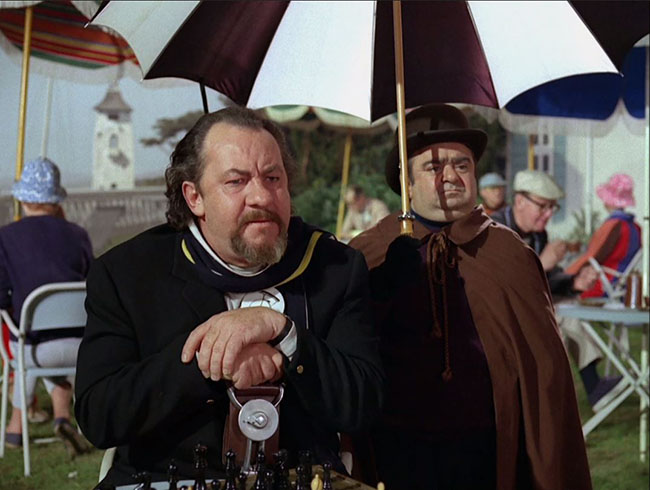
Leo McKern as No.2, accompanied by the Butler (Angelo Muscat).
OBSERVATIONS
“The Chimes of Big Ben” is a justly lauded episode of The Prisoner, featuring delightful sparring between the well-matched McGoohan and McKern and a satisfying and clever script by TV veteran Vincent Tilsey. There’s even a nice diversion into satire, with the target being the art world. All the Villagers create representations of McKern’s recognizable face and profile: as a giant Roman coin, as sketches and paintings, or as the King in a chess set. Only No.6 chooses to create something abstract, which baffles but impresses the art committee selected to assign prizes. (“There’s only one thing I don’t understand,” says one of the critics. “Where’s No.2?”) The episode keeps things rather light – despite another disturbing Hospital scene – thanks to McKern, whose teddy bear looks and boisterous laughter are the perfect complement to McGoohan’s intense, sardonic, and arch portrayal of the Prisoner. (In a typical moment McGoohan will mutter something obstinate, and McKern will roar with laughter. This never gets old. I could watch it for days.) McGoohan must have taken note that something special was happening, since he invited McKern back for “Once Upon a Time” (which began production soon after this one); and then, some time later, for “Fall Out.” McKern appeared as No.2 more than any other actor in the series. (The runner-up is Colin Gordon, who played the role twice.)
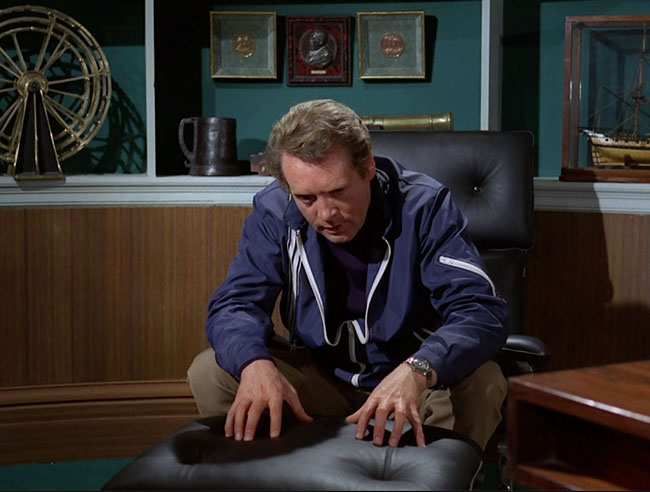
No.6 (Patrick McGoohan) returns, apparently, to his London office.
McGoohan didn’t want romance in either The Prisoner or Danger Man, but despite his efforts – and the marked resistance of No.6 – this is the most romantic episode of the series. The relationship between 6 and Nadia begins with mutual distrust, then slowly moves toward mutual respect: two intelligence experts collaborating to escape the Village. In Checkmate, No.6 had to do the heavy lifting himself, despite the assistance of some other prisoners. With Nadia he has an equal, not to mention someone who knows where the Village is. Although I’m sure most people think of the great “chimes of Big Ben” reveal when they think of this episode, for me the standout scene is No.6 and Nadia sharing a claustrophobic crate, their bodies separated by a thin wall, Nadia flirting with No.6 and No.6 just barely indulging her. It’s about as warm as The Prisoner ever gets. But all this warmth – McKern the teddy bear laughing; Nadia calling No.6 “Big Ben” and asking if he’s engaged to anyone – is all setting us up for one shocker of a climax, when No.6 realizes that he is just as alone as ever. Not only has No.2 pretended to be the dunce while expertly outwitting him (if only Big Ben hadn’t chimed, of course), but Nadia is not really Nadia. Isn’t it amazing that this series ever made it to air? Episode after episode, the viewer is punched in the gut. No.6 loses and loses and loses. But despite all this, The Chimes of Big Ben is entertaining from start to finish; the viewer might be gut-punched by the final moments, but they’ll come back for more from this eccentric series.
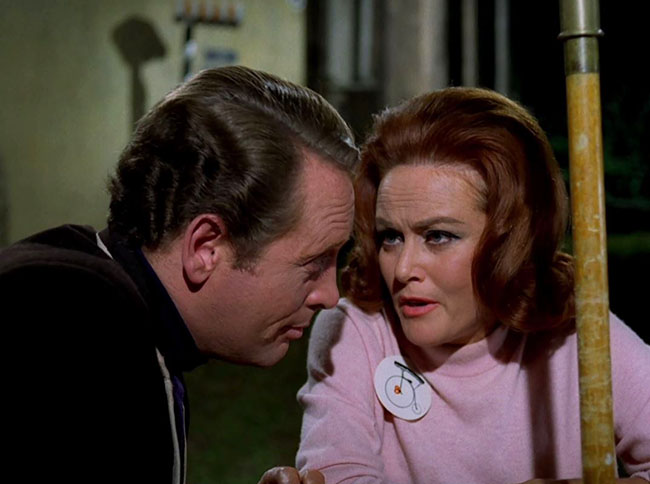
No.6 plots in public with Nadia (Nadia Gray).
NUMEROLOGY
In “Arrival,” No.6 played chess at the Old People’s Home with the Admiral, No. 66. Now he plays chess with the corpulent “Old General” (as the script refers to him), No.54. It’s unclear what happened to No.66, nor why he wasn’t brought back for this episode. One thing’s certain: the Old General is a jerk. First he lectures No.6 for not giving in to the Village, then, at the Arts & Crafts expo, he tells him he doesn’t like his art. But No.6 is polite to the last, and compliments his chess set, with its King carved in the likeness of No.2.
Nadia is No.8. You might remember that the Queen from “Checkmate” was also No.8. An explanation seems to arrive when No.2 says that the former No.8 is no longer here, refusing to give details despite No.6’s persistence. But the former No.8 was apparently a “he,” so it’s not the same one we met. If we’re going to take this detail seriously, then something mysterious happened to the Queen after “Checkmate,” she was replaced by a man, and he either escaped or was killed – and then Nadia arrived. Yes, one has to work overtime to explain why the prop department kept reissuing the same number badges while the continuity person took a holiday.
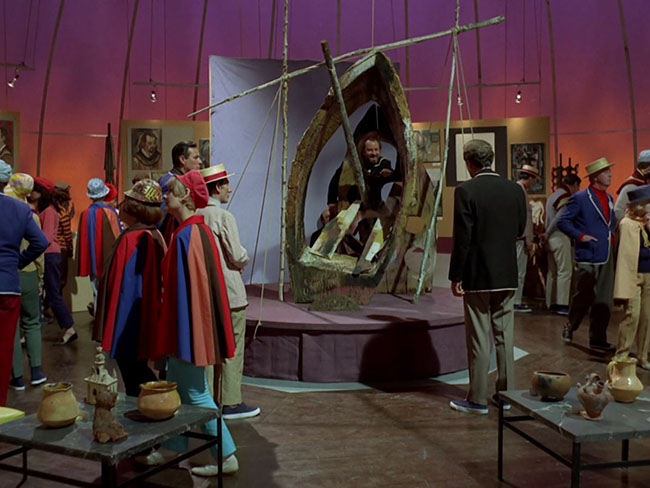
No.6 explains his art project, “Escape,” at the Arts and Crafts Exposition.
SEQUENCE
“The Chimes of Big Ben” aired second in the U.K., but it resists that chronology. When Nadia arrives, No.2 says, “It’s like old times, No.6. Do you remember your first day?” Given that so many episodes exist in which he says he’s newly arrived, this one should be pushed back a bit from the premiere. It was, as it’s presented in my sequence, the fifth episode to go into production. This is a good spot for it, particularly after the downbeat-all-over “Dance of the Dead.” The light comic tone is refreshing, and, for the first time, No.6 actually breaks free of the Village border and apparently makes it back to London. Of course, he hasn’t really, but it’s genuinely exciting after four episodes of no progress.
THE VILLAGE
After this episode is over we realize we can’t trust the information we’ve been given, but for what it’s worth, according to Nadia they are in Lithuania, on the Baltic, 30 miles from the Polish border. No.6 is surprised that his superior, Colonel J, hasn’t heard of the Village. We soon see that not only have Colonel J and Fotheringay heard of the Village, but they are employed by it. Its insidious reach extends everywhere. There’s an intriguing exchange between No.2 and No.6 regarding the nature of the Village, which places everything in Cold War terms:
No.6: Has it ever occurred to you that you’re just as much a prisoner as I am?
No.2: [laughs] My dear chap, of course, I know too much. We’re both lifers. I am definitely an optimist. That’s why it doesn’t matter who No.1 is. It doesn’t matter which side runs the village.
No.6: It’s run by one side or the other.
No.2: Oh certainly. But both sides are becoming identical, what in fact has been created [is] an international community, a perfect blueprint for world order. When the sides facing each other suddenly realize they’re looking in a mirror they’ll see that this is the pattern for the future.
No.6: The whole Earth as the Village?
No.2: That is my hope. What’s yours?
No.6: I’d like to be the first man on the Moon.
The original script has a bit more of No.2’s thoughts here. He says, “Nationalism’s a disease but it breeds its own antibodies…This place has been built from the very worst nationalistic motives. But what has been created? An international community…” etc.
METHODOLOGY
Once again we have No.2 expressing the desire to keep No.6 intact and use more subtle means to learn his secrets. He may want to break him, but “I don’t want a man of fragments,” he says. Instead he enacts what is surely one of the most complicated plots in the series, and it very nearly works – which is why No.1 reassigns him to the case in “Once Upon a Time.”
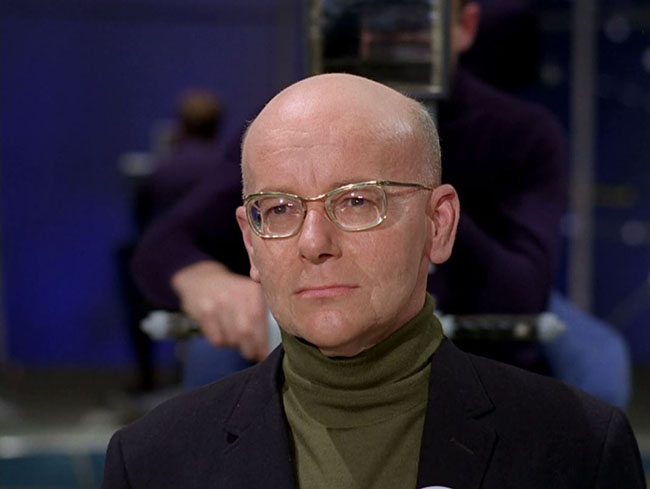
Peter Swanwick as the Supervisor.
THE SUPERVISOR
One of the few recurring roles in The Prisoner goes to Peter Swanwick as the bald, impassive, turtleneck-wearing Supervisor. The Supervisor stands in the center of the Control Room with its see-saw camera-watching contraption rotating beside him, a map of the Village splayed out in 360 degrees, and a large screen showing him what No.6 is up to now. He’s the one who intones, “Orange alert. Orange alert,” often with a phone in hand. He gives a slight smile in “The Chimes of Big Ben” when he sees that No.6 has escaped on a boat with Nadia: one of the few clues that this is all part of No.2’s plan. He serves many No.2’s, but one gets the feeling that his true master is No.1 – the only constant authority in the Village. He is the living embodiment of ubiquitous Village security, and he’s the one who unleashes Rover. Swanwick was born in 1922 and died in 1968, the year The Prisoner ended. Among his film credits are The African Queen (1951) and one of the best Hammer films, The Devil Rides Out (1968), where he played one of the cultists.
ROVER
To carry the swimming Nadia back to shore, Rover seems to split into three Rovers – one big, two small. Later on, we see Nadia’s Polish contact shooting a rifle at Rover. This, at last, seems to deter the thing.

The original ending credits tag for “The Prisoner” is glimpsed in the early edit of “The Chimes of Big Ben.”
ALTERNATE “CHIMES”
Many years ago an alternate, early edit of “The Chimes of Big Ben” was discovered, which contains a handful of surprising differences from the final cut. (Another rough cut of an episode, for “Arrival,” was discovered later.) The opening credits contain the rejected theme music of Wilfred Josephs. As No.6 drives his car to his office to resign, there is no music at all, just the sound of thunder. Then it kicks in, a bizarre, almost avant-garde piece of discordant, dizzying music. During the opening credits dialogue exchange between No.6 and No.2, we see a few rare shots of No.6 assaulted by Rover that are not in the final edit of this montage. Early in the episode, No.6 is seen observing the stars using a Greek device called the Triquetrum, which he hopes will tell him where the Village is located. The view of the night sky was actually “borrowed” from 2001: A Space Odyssey (1968), as Kubrick was filming at the same studio; Kubrick wasn’t aware that the shot had been loaned out to The Prisoner. But the most eye-opening change is the end credits. After the penny-farthing has been assembled (the standard component of this sequence), the wheels become the Earth and the Universe. The Universe fills the background, the Earth spins toward the viewer, and just as it obscures the frame, a red circle with the word “POP” leaps at us. The meaning of “POP” will come much later in the series, but this seems to have been intended as a bit of coded symbolism from the mischievous McGoohan – something deemed too bizarre for the final cut, which substituted the overused shot of Rover “popping” out of the sea.
WIN OR LOSE?
No.6 loses just as he’s thought he’s won. His silence in the final scene speaks volumes.
QUOTES
No.2: He can make even the act of putting on his dressing gown appear as a gesture of defiance.
Assistant: There are methods we haven’t used yet, of course.
No.2: I want him with a whole heart, body and soul.No.2: And here he is, our very own Epstein.
No.6: Can I help?
Awards Committee Member: We’re not quite sure what it means.
No.6: It means what it is.
No.2: Brilliant. It means what it is. Brilliant. Oh no, you mustn’t let me influence you. You are the awards committee.
Awards Committee Member 2: What puzzled me, No.6, is the fact that you’ve given the group a title. “Escape.”
No.6: This piece, what does it represent to you?
Awards Committee Member 3: A church door?
No.6: Right the first time.No.6: I risked my life and hers to come back here, home, because I thought it was different. It is, isn’t it? It’s different?!
Colonel J: Let’s start at square one. Why did you resign?
No.6: It was a matter of conscience.
UP NEXT: THE SCHIZOID MAN
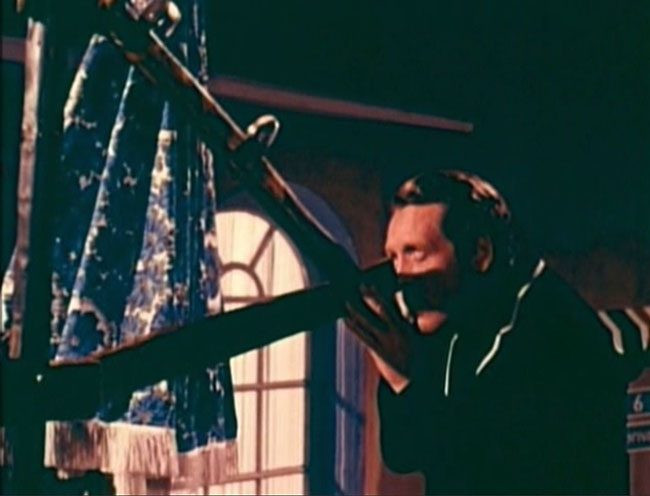
No.6 with the Triquetrum in a deleted scene.

